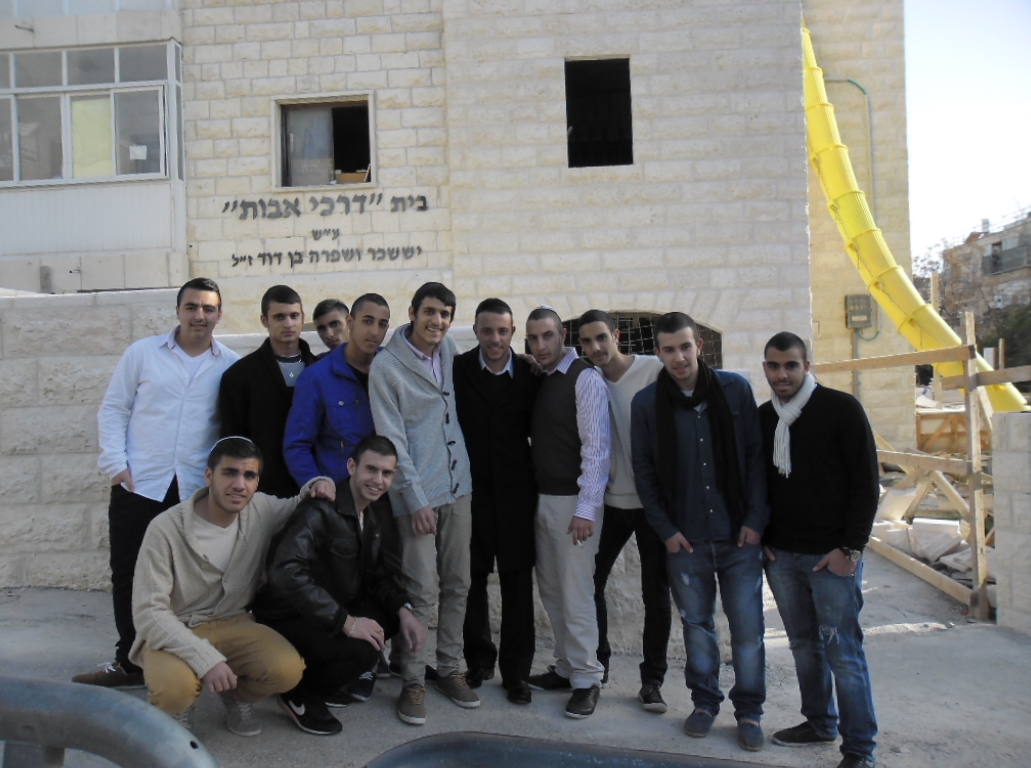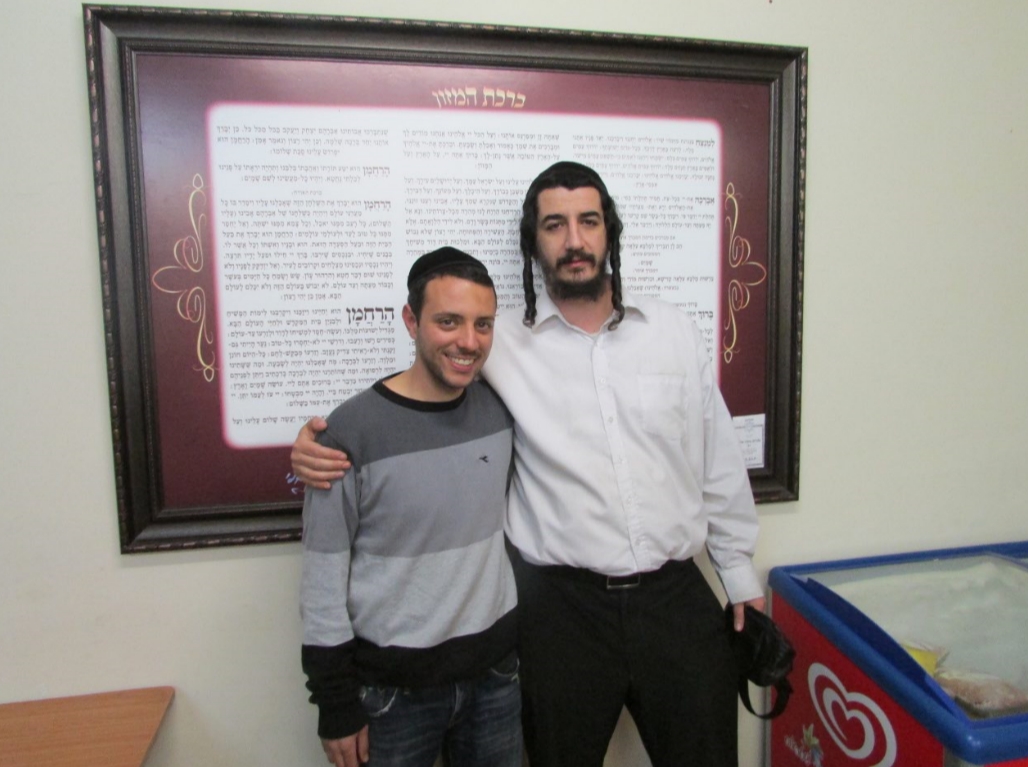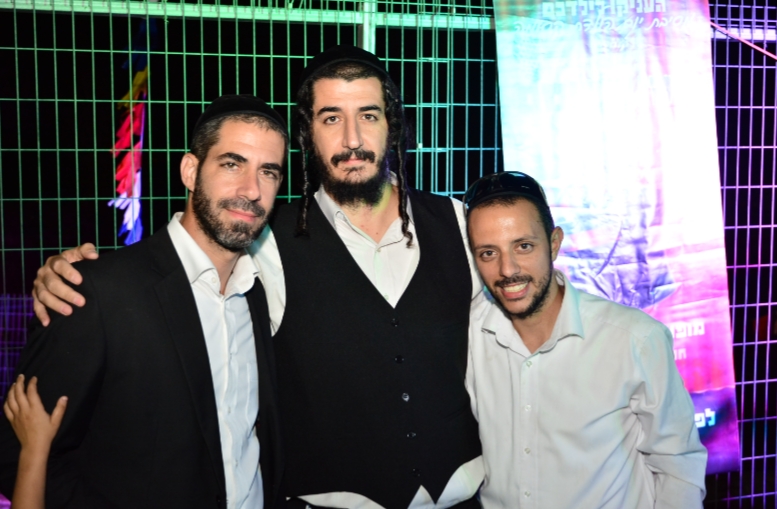The Story of Moshe Attiya: "How I Survived Natural Hazards in Thailand and Founded a Yeshiva"
When the tourist bus in Thailand overturned with Moshe Attiya inside, he felt how 'nature' was taking over him, but only later did he discover that 'nature' in numerology is 'God.' This was the first stop on his journey back to faith, leading to many others following his path.
 Moshe Attiya
Moshe AttiyaIf you arrive in Kiryat Shmona and mention the name 'Moshe Attiya' on the streets, it seems everyone knows who you are talking about. Moshe Attiya is one of the most well-known people in the northern city. 'Rabbi Moshe,' as the youth respectfully call him, is someone they come to for advice on various subjects, seeking his counsel or just pouring out their hearts to him as if he were their older brother.
Moshe manages to support, strengthen, and even endear Judaism to them, which they hadn't known before. He excels at this because he, too, came from the same background at their age and identifies exactly with what they are going through.
Where Was God?
"I was born in the Krayot, near Haifa," he begins his story. "My family was very far from observing mitzvot, and as a teenager, the main thing that interested me was soccer. I played in the Hapoel Haifa youth division and was very good at it. I thoroughly enjoyed it, and honestly, not much else occupied me at the time.
"At 17, deep into the world of soccer and parties, a childhood friend named Yitzchak Raz spoke to me. Today he is Rabbi Yitzchak Raz and heads a yeshiva, but back then, he was just like me. We had been friends since birth and shared our childhood together. However, at 17, I noticed a change in him. He said to me, 'Moshe, there's a Torah class at our friend's house, and there's food and drinks, want to come?' I remember my reaction: 'Forget the food and drinks,' I laughed, 'Forget Torah, I want to play soccer, I have practice now.' But Yitzchak convinced me: 'What do you have to lose? Let's try. What can we lose?' Somehow, he persuaded me. We went to the class, and although I didn't really understand what the rabbi was talking about, I was very active. I kept asking questions, trying to prove to the rabbi how wrong he was. Later, when we left, I told Yitzchak the class was really boring. Nonetheless, over the next year, I found myself occasionally accompanying him to these classes. I always asked the questions that had always been on my mind: Why is there an afterlife? Why didn't Hashem save the Jews in the Holocaust? What is a soul? What is my purpose?"
At the end of that year, Moshe enlisted in the army, and since then, he had not attended the rabbi's classes. "The spiritual strength I had received began to fade, but towards the end of my military service, Yitzchak contacted me again and informed me that a well-known rabbi was coming to Kiryat Ata to give a lecture to 700 people. He didn't ask if I wanted to come, he simply informed me that I'm coming with him.

"I arrived at the lecture and was immediately agitated. My friends encouraged me, and I remember bursting out in front of everyone: 'Rabbi, I have a grandmother who is a Holocaust survivor, she suffered a lot. I want to know now – Where was God during the Holocaust?'"
And What Did the Rabbi Reply?
"The truth?" Moshe says seriously, "I have no idea. I didn't try to listen, I wasn't focused, I just wanted to ask. The only thing I remember is the rabbi mentioned several times that Hashem can be seen in nature, as the word 'God' in numerology is 'nature.' Later, as I continued to challenge the rabbi, he responded, 'I see you're interested. I suggest you go to a yeshiva for a month. The first three weeks will be difficult, but in the last week, they'll answer all your questions, and if they don't, I will.' I heard this and rudely replied: 'Now it's a bit late. Next week I'm going on a trip to Thailand with my girlfriend.'"
A Nightmare Trip
"And that's exactly what happened," Moshe continues his story. "A week after that lecture, I went on a trip with my girlfriend, who is now my wife. We traveled to Thailand for a particularly adventurous trip. From the start, I said I didn't want to fly to Thailand at all, preferring Europe, with hotels and no adventures. But my wife insisted and convinced me too. I remember on the day of the flight, we arrived at the airport and I had a strong gut feeling saying, 'Don't get on the plane,' and yet we traveled. Even when we arrived in Thailand, I had bad feelings. We landed in Bangkok, and although many travel books call the place 'paradise,' I felt like we had arrived in hell. There was a lot of impurity there that could really be felt. Another thing that bothered me was the lack of human value. You could see a person who fell on the street and couldn't get up, and no one cared."
As for the trip itself, Moshe notes he and his wife met a group of Israelis there and they traveled together. At a certain point, they were supposed to get on a bus, but he felt he couldn't. "I couldn't explain why, but I felt we were heading for disaster with that bus," he recalls, "I tried to convince our friends to take a special taxi and share the cost, but they laughed at me. I gave up, and the only things I took with me on the bus were a camera and a first-aid kit. Before we got on the bus, I photographed it from all sides. Everyone laughed at me: 'What are you taking pictures for?' and I replied, 'In case something happens, we can use these photos for a claim.'"
They got on the bus, and the journey began. "We were sleepy," he recalls, "and I remember dreaming that the bus rammed into a truck and we all flew. I woke up terrified and then saw that everything was okay, but a minute later, exactly what I dreamed of happened in reality.
"We were on one of the fastest roads in Thailand when I realized the bus was veering off its path and flipping over onto the side of the road. The main thing I remember from this harrowing experience is clinging to the seat in front of me as the bus flipped and skidded about 200 meters on the road. Later, we learned that there was probably a truck that gave the bus a slight hit. The driver lost control, and that's how we ended up in the ditch."
And as Moshe emphasizes, they had a great miracle. "We could have tumbled hundreds of meters into an abyss, but we stopped thanks to a large tree trunk nearby. Almost all the passengers were injured, but thank Hashem there were no fatalities."
Moshe himself only got a scratch, and when he realized he was in a better state than the others, he quickly searched for the first-aid kit and started tending to the wounded. "I was on auto-pilot – I called the insurance company in Israel and reported the accident. Later, an ambulance arrived, and we suddenly grasped what a third-world country is like. The ambulance was small, and we had to fight for a spot. The hospital we were taken to was horrifying. The doctors there didn't know a word of English, and the equipment they used looked like it was from the Middle Ages, with lizards and worms crawling on the walls. It was terrifying. After half an hour, a doctor came to us and signaled with hand movements that we were being transferred to a different hospital.

"We thought the hospital we would be transferred to would be more decent, but we were wrong. We were there for hours, and only then did Israel's ambassador in Thailand call us to find out the condition of the injured and where we were. I spoke to him and gave him all the details, and then he informed us: 'I'm sending two ambulances with doctors to take you to the best hospital in the country.' And indeed, the ambulances arrived, and we were taken to one of the top ten hospitals in the world."
A few days passed, some of the wounded were flown back to Israel, and the others were discharged from the hospital. After some deliberation, Moshe and his girlfriend decided to continue their trip, but the continuation was no better than the beginning. "Time and again, we felt how Hashem was striking us and simply showing us that we had nothing to seek there, in a country full of idol worshippers. When we boarded a ship for a cruise, it almost capsized into the ocean full of dangerous sharks; then, when we were on the beach, we rented a car, but crashed into a local vehicle and it was ruined; when we boarded a plane, there was a serious accident and the wing nearly broke. Time and again, we encountered dangers that simply proved to us how small we are and how incapable we are of planning anything."
Only after they finally returned to Israel, Moshe says he suddenly realized and remembered what the rabbi once said in his lecture – "God in numerology is nature." "Suddenly I understood how looking at nature shows how great Hashem is. Because He is the one who can, in an instant, turn you over in the water, cause you an accident, or anything else, your life is solely in His hands."
The Torah Reaches the North
Moshe's next step was to attend regular Torah classes. "I began attending regular Torah classes, and around that time, I also married my wife and we started our lives. After the wedding, we settled in Kiryat Shmona and gradually strengthened our Judaism. It's not like we suddenly started observing all the commandments, but it all came in stages."
But Moshe says that since he began strengthening his faith, he also understood how Torah classes can transform a person's soul, which led him to invite a rabbi to hold regular classes for the youth living in the city. Thus, young people began gathering, initially at home and later in the synagogue.

Over the years, the activity developed, and the connection between Moshe and the youth tightened. "We established a club of 'Ohr Yisraeli' – a youth movement led by Rabbi Grossman," he relates, "and several dozen guys come to the club weekly. All are completely secular, and it's amazing to see them come, open books, listen to Torah classes, and travel with us to holy places. It's amazing and touching."
But How Do You Explain It? What Makes a Secular Teenager Come to Hear Torah Classes?
"There's no single answer. Each one is drawn here for a different reason. Some are simply looking for something to do and are bored, some enjoy the food and the games of snooker and soccer we play between classes, and others are simply pulled along by their friends. I myself 'fish' these guys usually late at night - from eleven at night onwards, I roam the streets and see them sitting on fences, roaming around and doing nonsense, so I talk to them and recommend they come to our yeshiva. Today, after about four years of activity, I think there is almost no teenager in the city who doesn't know me."
And Moshe is not just responsible for the Torah classes; he has also become the wall of tears for the teenagers in recent years. "They tell me things they wouldn't dare tell their parents. More than once, I hear about teenagers who have reached the lowest of lows, and I try to rehabilitate them in any way and save them."
And his greatest satisfaction is that eventually, some of these teenagers end up in holy yeshivas. "More than once, I refer them to Rabbi Yitzchak Raz's yeshiva – my friend who, thanks to him, I became interested in Judaism and reached where I am today. It's a real closing of a circle."
These days, as he notes, Moshe is working to open a formal kollel in Kiryat Shmona and even establish a high school for young people who will come from outside the city. The yeshiva will also include young people returning to faith, and eventually, a minor yeshiva is also expected to open. And what's next? "The sky is the limit," he says and then adds with great hope: "My big dream is for Kiryat Shmona to become a Torah city. I completely believe it can come true."

